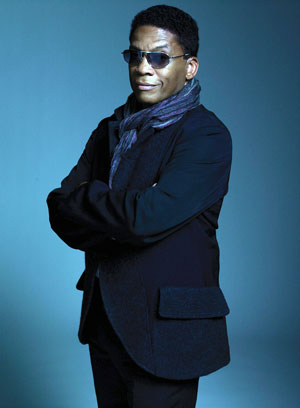
It’s been a good year for Herbie Hancock.
The 68-year-old jazz pianist, whom many (including the late Miles Davis) place second only to Thelonious Monk on the all-time-greats list, began the year by accomplishing something that had been done only once before by a jazz instrumentalist—and not for 43 years: He produced a record that won the Grammy Award for Album of the Year.
“The shock of winning was … that was just a rare moment in my life, a rare moment for jazz, I would say,” Mr. Hancock recalled during a phone interview last weekend from the JVC Jazz Festival in Newport, R.I. (The first jazz album to be so honored was “Getz/Gilberto” in 1964, by Stan Getz and Joao Gilberto.)
Mr. Hancock will ride his high into the Westhampton Beach Performing Arts Center on August 17.
Even for a man who has racked up enough trophies to fill a cruise ship, including a dozen Grammy Awards, the thrill of winning clearly has not lost its effect. Not this time. Not this award.
The album was “River: The Joni Letters,” a reinterpretation of Joni Mitchell’s best known music, and the project crystallized a couple of recent trends in Mr. Hancock’s ever-shifting musical proclivities.
First, it further, and dramatically, illustrated that very shift. Mr. Hancock’s legacy will be as a restless experimenter, broadening the definition of jazz. (It probably helps that he entered college planning to be an electrical engineer.) Never one to limit himself to a genre or label, Mr. Hancock introduced and popularized the use of synthesizers and computers in post-bop jazz, and he continues to edge away from traditional concepts of music—this time working closely with pop lyrics as never before.
Building off “Possibilities,” his 2005 record on which he collaborated with a number of famous pop and rock musicians, “River” explores the borderland between jazz and pop.
“I’m thinking more in terms of music expressing aspects of life, which is what music
should be anyway, but I’m not trying to funnel it through any particular genre per se,” he said of his current approach to music. “Even though the particular language may not necessarily be straight-ahead jazz, the attributes of jazz, like being in the moment, and spontaneity, a certain kind of group effort or collaborative effort, will certainly be presented. So in a sense, the spirit of jazz will be there without having to put it in a box called jazz. I don’t like working in boxes anymore.”
Secondly, like “Possibilities,” the new album was recorded with the help of a star-studded roster of successful solo artists, many of whom would not be considered jazz musicians. “River” includes cuts featuring Tina Turner, Norah Jones, Corinne Bailey Rae, and 19-year-old Sonya Kitchell; “Possibilities” featured contributions by John Mayer, Sting, Joss Stone, Paul Simon, Annie Lennox, Christina Aguilera and Trey Anastasio, among others.
During his Grammy acceptance speech, Mr. Hancock thanked the recording academy for “breaking the mold” and in so doing honoring “the giants upon whose shoulders I stand, some of whom, like Miles Davis and John Coltrane, unquestionably deserved this award in the past. But this is a new day that proves the impossible can be made possible. Yes, we can, to coin a phrase.”
The concert in Westhampton Beach is the last stop on Mr. Hancock’s “River/Possibilities” tour. He’ll be accompanied by drummer Vinnie Colaiuta, bassist Dave Holland, guitarist Lionel Loueke, saxophonist Chris Potter, and two singers, Ms. Kitchell and Amy Keys.
After the tour’s conclusion, Mr. Hancock said he’ll focus more on a new album expected to explore an even wider musical palette, taking inspiration from John Lennon’s “Imagine.”
“This project will be a global project, involving collaborations with artists from various countries, various cultures and various languages,” he said. “It’s not just a record for America. It’ll be about the concept of bringing people together, and peace, and it’ll focus on some of the major crises of our time.”
But to speak only of winning a historic Grammy, completing a successful tour, and launching an innovative recording project minimizes the year Mr. Hancock has had.
Shortly after his Grammy win, sales of his music doubled and “River” skipped several thousand spots on Amazon.com’s rankings to number one; he was named one of Time magazine’s 100 most influential people; he was named musician of the year by an association of jazz journalists; he received an honorary doctorate from a university in Japan; he was honored by Harvard University, as well, and Verve has announced plans to release a definitive compilation CD of Mr. Hancock’s work from a number of different labels, including Blue Note, Sony and Warner Bros. “There’s a lot of things that happened all at once,” he said, still clearly amazed by the level of his success.
When he reflects on his recent accomplishments, Mr. Hancock seems more pleased by the way the honors reflect on the music, and its possible reverberations into the future, than on him personally. “As long as the honors are encouragement to others, as long as what I represent in getting those honors is something that is of value to young people and to other people who may be looking up to me as one of the elders, as long as it is an encouragement to them, then I feel that automatically makes those honors … serve a positive end,” Mr. Hancock reasoned. “As far as me receiving honors, I don’t work to receive honors. I’m always thinking about the next thing.”
So what’s “the next thing” he is thinking about to follow up on all the successes of 2008? Whatever else develops, he’ll be starting off 2009 on a high note: In January, he’ll be sailing around the Caribbean as a guest musician on the inaugural Playboy Jazz Cruise.
And, like the vessel that carries him to tropical ports of call, he will no doubt continue to leave a very large wake.